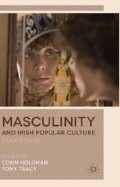Abstract
Musicians of Irish descent have played a long-standing role in the history of British popular music, through figures such as John Lydon, Elvis Costello (Declan McManus), Kevin Rowland, Boy George (George O’Dowd), Shane MacGowan, Morrissey, Johnny Marr, and Noel and Liam Gallagher (of Oasis). Many of these musicians have been at the forefront of Britain’s most significant popular-musical epochs, thus John Lydon and punk in the 1970s, The Smiths and ‘indie’ in the mid-1980s, and Oasis and ‘Britpop’ in the 1990s.1
Access this chapter
Tax calculation will be finalised at checkout
Purchases are for personal use only
Preview
Unable to display preview. Download preview PDF.
Notes
Sean Campbell, ‘Popular music-making among the Irish diaspora in England’, in Harry White and Barra Boydell (eds), The Encyclopedia of Music in Ireland (Dublin: UCD Press, 2013).
Sean Campbell, ‘Irish Blood, English Heart’: Second-Generation Irish Musicians in England (Cork: Cork University Press, 2011).
Máirtín Mac an Ghaill, ‘What about the lads? — Emigrants, immigrants, ethnics and transnationals in late 1990s diaspora’, in Ronat Lentin (ed.), Emerging Irish Identities: Proceedings of a Seminar Held in Trinity College Dublin, 27 November 1999 (Dublin: Trinity College, Dublin, 2000), 52.
Dave Rimmer, New Romantic: the Look (London: Omnibus Press, 2003), 124–5.
Mike Moore cited in Johnny Rogan, Morrissey and Marr: the Severed Alliance (London: Omnibus Press, 1992), 69.
Simon Reynolds and Joy Press, The Sex Revolts: Gender, Rebellion and Rock ‘n’ Roll (London: Serpent’s Tail, 1995), 48.
Ian Biddle and Freya Jarman-Ivens, ‘Introduction: Oh Boy! Making masculinity in popular music’, in Freya Jarman-Ivens (ed.), Oh Boy! Masculinities and Popular Music (London: Routledge, 2007), 7.
See Sean Campbell, ‘“Race of Angels”: the critical reception of second-generation Irish musicians’, Irish Studies Review 6 (2) (1998), 165–74.
Robinson cited in Breda Gray, ‘The home of our mothers and our birthright for ages? Nation, diaspora and Irish women’, in M. Maynard and P. Purvis (eds) New Frontiers in Women’s Studies: Knowledge, Identity and Nationalism (London: Taylor and Francis, 1996), 182.
See Peter Byrne, Football Association of Ireland — 75 Years (Dublin: Sportsworld, 1996).
Cited in Paul Rowan, The Team That Jack Built (Edinburgh: Mainstream, 1995), 57.
Donald Akenson, The Irish Diaspora: a Primer (Toronto: P. D. Meany, 1996), 6.
Michael Holmes, ‘Symbols of national identity and sport: the case of the Irish football team’, Irish Political Studies 9 (1994), 81–98.
See, for example, Marcus Free, ‘Tales from the fifth green field: the psycho-dynamics of migration, masculinity and national identity amongst Republic of Ireland soccer supporters in England’, Sport in Society 10 (3) (May 2007), 476–94.
Mary J. Hickman and Bronwen Walter, ‘Deconstructing whiteness: Irish women in Britain’, Feminist Review 50 (Summer 1995), 12.
Joanna Knowles, ‘“New Lad” fiction’, in Michael Kimmel and Amy Aronson (eds), Men and Masculinities: a Social, Cultural, and Historical Encyclopedia (Santa Barbara: ABC-CLIO, 2004), 569.
For an address to evocations of masculinity in rock music, see Freya Jarman-Ivens (ed.), Oh Boy! Masculinities and Popular Music (London: Routledge, 2007).
For an account of masculinity in ‘indie’ rock, see Matthew Bannister, White Boys, White Noise: Masculinities and 1980s Indie Guitar Rock (Aldershot: Ashgate, 2006).
Paul Gallagher and Terry Christian, Brothers: From Childhood to Oasis — The Real Story (London: Virgin, 1996), 67–8, emphases added.
Quoted in Eugene Masterson, The Word on the Street: the Unsanctioned Story of Oasis (Edinburgh: Mainstream, 1996), 56.
See, for example, Philip Ullah, ‘Second-generation Irish youth: identity and ethnicity’, New Community, 12 (Summer 1985), 317–19;
Aidan Arrowsmith, ‘Writing “home”: nation, identity and Irish emigration to England’ (unpublished PhD thesis, University of Staffordshire, 1998), 214, 219–21, 236–7.
Paolo Hewitt, Getting High: the Adventures of Oasis (London: Boxtree, 1997), 141.
Philip Ullah, ‘Rhetoric and ideology in social identification: the case of second generation Irish youths’, Discourse and Society (1990) 1 (2), 179.
Simon Frith and Angela McRobbie, ‘Rock and sexuality’, Screen Education, 29 (Winter 1978–9), 3–19.
Ben Stud and Simon Price, ‘The Yob Rock debate’, Melody Maker, 29 June 1996, 30–3.
Steve Sutherland, ‘See! Hear! Now!’, NME, 20 September 1997, 40.
For an account of Celticism, see Martin Stokes and Philip V. Bohlman (eds), Celtic Modern: Music at the Global Fringe (Lanham, MD: Scarecrow Press, 2003).
Terence Brown, Ireland’s Literature: Selected Essays (Dublin: Lilliput Press, 1988), 7.
See, for example, Matthew Wright and Richard Wallace, ‘Liam’s mad for it!’, Daily Mirror, 28 August 1996, 2–3;
Mike Darvill and John McJannet, ‘Wild man Liam held’, Daily Star, 5 November 1998, 1.
The fact that Best was a Northern Irish Protestant might have distinguished him, in certain respects, from Manchester’s Irish Catholic inhabitants. However, his public persona seems to have resonated with certain stereotypes of the Irish in England more often associated with Irish Catholics. Significantly, Best himself was not averse to expressing Celticist ideas with regard to the Irish diaspora in England: ‘whether you’re Irish by parentage, by birth, or just have a bit of our blood in the family then it’s odds on you’ll be all the more interesting and entertaining because of it’ (George Best, George Best’s Soccer Annual No. 5 (London: Pelham Books, 1972), 86).
See Gerry Smyth, Noisy Island: a Short History of Irish Popular Music (Cork: Cork University Press, 2005), 75;
Gerry Smyth, ‘Who’s the greenest of them all? Irishness and popular music’, Irish Studies Review 1 (2) (1992), 5.
For a reflection on this point, see Sean Campbell, ‘Beyond ‘Plastic Paddy’: a re-examination of the second-generation Irish in England’, Immigrants and Minorities 18 (2,3) (1999), 266–88.
Jeremy Gilbert, ‘White light/white heat: jouissance beyond gender in the Velvet Underground’ in Andrew Blake (ed.) Living Through Pop (London: Routledge, 1999), 45.
Editor information
Editors and Affiliations
Copyright information
© 2014 Sean Campbell
About this chapter
Cite this chapter
Campbell, S. (2014). ‘Irish Lads’ and English Rock: Musical Masculinities in the 1990s. In: Holohan, C., Tracy, T. (eds) Masculinity and Irish Popular Culture. Palgrave Macmillan, London. https://doi.org/10.1057/9781137300249_6
Download citation
DOI: https://doi.org/10.1057/9781137300249_6
Publisher Name: Palgrave Macmillan, London
Print ISBN: 978-1-349-45307-8
Online ISBN: 978-1-137-30024-9
eBook Packages: Palgrave Media & Culture CollectionLiterature, Cultural and Media Studies (R0)

